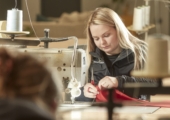To provide the best experiences, we use technologies like cookies to store and/or access device information. Consenting to these technologies will allow us to process data such as browsing behaviour or unique IDs on this site. Not consenting or withdrawing consent, may adversely affect certain features and functions.
The technical storage or access is strictly necessary for the legitimate purpose of enabling the use of a specific service explicitly requested by the subscriber or user, or for the sole purpose of carrying out the transmission of a communication over an electronic communications network.
The technical storage or access is necessary for the legitimate purpose of storing preferences that are not requested by the subscriber or user.
The technical storage or access that is used exclusively for statistical purposes.
The technical storage or access that is used exclusively for anonymous statistical purposes. Without a subpoena, voluntary compliance on the part of your Internet Service Provider, or additional records from a third party, information stored or retrieved for this purpose alone cannot usually be used to identify you.
The technical storage or access is required to create user profiles to send advertising, or to track the user on a website or across several websites for similar marketing purposes.
 Nearly 60 percent of HR leaders reported that building critical skills and competencies will be their number one priority in 2022, according to a survey by Gartner, Inc. The survey of more than 550 HR leaders in July 2021, claims the other top HR priorities for 2022 are: organisational design and change management (48 percent), current and future leadership bench (45 percent), the future of work (42 percent) and diversity, equity and inclusion (DEI) (35 percent). (more…)
Nearly 60 percent of HR leaders reported that building critical skills and competencies will be their number one priority in 2022, according to a survey by Gartner, Inc. The survey of more than 550 HR leaders in July 2021, claims the other top HR priorities for 2022 are: organisational design and change management (48 percent), current and future leadership bench (45 percent), the future of work (42 percent) and diversity, equity and inclusion (DEI) (35 percent). (more…)






 Millions of British workers face uncertainty as a snapshot of the nation’s work practices claims that one in five employees are unsure whether they’ll be expected to work remotely, onsite, or a mix of both in the future. Without having a clear decision from their employer, some employees are unsure about their organisations’ return-to-office plans.
Millions of British workers face uncertainty as a snapshot of the nation’s work practices claims that one in five employees are unsure whether they’ll be expected to work remotely, onsite, or a mix of both in the future. Without having a clear decision from their employer, some employees are unsure about their organisations’ return-to-office plans. 
 Results from
Results from 
 In 2008, the philosopher and ecologist
In 2008, the philosopher and ecologist 
 Managers in the increasingly digital, knowledge-fuelled and hybrid working environment may not be able to see the “invisible” strains on workers juggling home life and their workloads, a report by
Managers in the increasingly digital, knowledge-fuelled and hybrid working environment may not be able to see the “invisible” strains on workers juggling home life and their workloads, a report by 
 While the move to flexible and hybrid working is widely accepted by businesses, their preparedness to implement such a strategy is not yet fully realised. That is the key finding of
While the move to flexible and hybrid working is widely accepted by businesses, their preparedness to implement such a strategy is not yet fully realised. That is the key finding of 


 At this time of year, with events such as Happiness at Work Week and
At this time of year, with events such as Happiness at Work Week and 
 New research from
New research from 
 New polling, carried out to mark the start of
New polling, carried out to mark the start of 









October 22, 2021
Employee experience is more important than ever
by Lizzie Rolley • Comment, Wellbeing, Working culture, Workplace